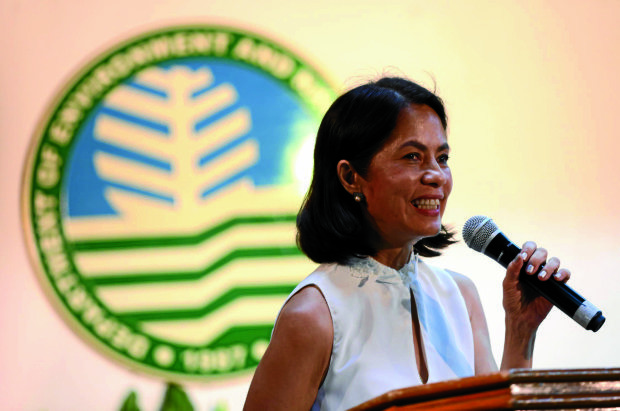Gina Lopez, green groups back coal tax hike to curb emissions

Former Environment Secretary Gina Lopez. INQUIRER PHOTO / LYN RILLON
Former Environment Secretary Gina Lopez and other environment and renewable energy advocates expressed support for the 3,000-percent hike in tax to be levied on coal.
Lopez lauded the initiative of senators who support bigger taxes for mining and coal, like Senators Joel Villanueva, Ralph Recto and Loren Legarda, who pushed for the P300 tax per metric ton of coal.
Voting 11-1, the Senate on Monday, November 27, approved a nearly 3,000% hike in coal taxes in three tranches from 2018 to 2020.
Coal has been imposed a tax of P10 per metric ton since 1977. Villanueva proposed that it be taxed P100 per metric ton. Legarda proposed that coal be taxed P100 for 2018, P200 for 2019, and P300 for 2020.
“I am elated that the Senate and other concerned government agencies are coming to the fore and doing what our Constitution dictates: That it is the duty of the State to intervene when the common good so dictates,” Lopez said.
READ: Senate OKs first package of tax reform program on final reading
“Coal and mining are so destructive of the well-being of our people. That these activities are even allowed at all is an unfortunate reality,” she said.
“We are the only country in the planet that gives a seven-year tax holiday for the destruction of our environment wherein 95% of the net income goes out of the local environment. Enough is enough,” she added.
The proposal has to be agreed by both chambers of Congress and the coal tax increase is not in the bill approved by the House of Representatives.
Clean energy advocates were quick to address the fears being spread by coal proponents that taxing coal will increase electricity costs in the country, saying that the coal tax will force these coal oligarchs to finally pay their due.
“What will raise the price of electricity is not the coal tax per se, but the passing on of fuel costs to the consumer enjoyed by coal plants,” said Center for Energy, Ecology, and Development Executive Director Gerry Arances.
“Removing the pass-through provision in the present energy law which allows this will protect consumers from taking the hit in levying taxes against the coal industry,” he continued.
Arances said that electricity consumers and energy poor communities may be the first to benefit from the coal tax if it is pursued in the right way.
“Just as the revenues from the excise tax on tobacco products are used primarily to fund health facilities, taxing coal may be allocated to address energy poverty issues and the shift to cleaner renewable energy alternatives,” Arances said.
Multisectoral coalition Sanlakas denounced the fear-mongering by coal proponents like Semirara chair Isidro Consunji, as well as their counterparts in the Senate.
“Now that their coal addiction is being threatened, they are mobilizing their allies in the Senate to stall and defeat the bill,” Pedrosa said.
“Taxes on emission-intensive industries, mining, and coal are long overdue,” said Sanlakas Secretary-General Atty. Aaron Pedrosa.
“It is detestable how coal proponents like Isidro Consunji of Semirara are threatening the consumers with higher electricity prices once the coal tax is passed, when they have been the ones profiting heavily and without risk because of the incentives shouldered by the citizens,” Pedrosa added. “Imposing taxes on coal is tantamount to saying there are no more free rides for coal oligarchs.” /jpv